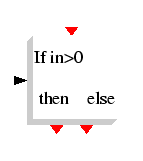Subsections
If-Then-Else
Events
One event is generated on one of the output event ports when an input
event arrives. Depending on the sign of the regular input, the event
is generated on the first or second output.
This is a synchro block, i.e., input and output event are synchronized.
| Set parameters |
|
| Inherit (1: no, 0: yes) |
1 |
| zero-crossing (0: no, 1: yes) |
1 |
- Inherit : 0 or 1; if zero, block has no input activation port.
- zero-crossing : use zero-crossing if active continuously
- always active: no
- direct-feedthrough: yes
- zero-crossing: yes
- mode: yes
- number/sizes of inputs: 1 / 1
- number/sizes of outputs: 0 /
- number/sizes of activation inputs: 1 / 1
- number/sizes of activation outputs: 2 / 1 1
- continuous-time state: no
- discrete-time state: no
- name of computational function: ifthel
scilab/macros/scicos_blocks/events/IFTHEL_f.sci
subroutine ifthel(flag,nevprt,ntvec,rpar,nrpar,ipar,nipar,u,nu)
c Scicos block simulator
c if-then-else block
c if event input exits from then or else clock ouputs based
c on the sign of the unique input (if input>0 then else )
c
c Copyright INRIA
double precision rpar(*),u(*)
integer flag,nevprt,nx,nz,ntvec,nrpar,ipar(*)
integer nipar,nu
c
common /dbcos/ idb
c
if(idb.eq.1) then
write(6,'(''ifthel t='',e10.3,'' flag='',i1)') t,flag
endif
c
if(flag.eq.3) then
if(u(1).le.0.d0) then
ntvec=2
else
ntvec=1
endif
endif
end
Ramine Nikoukhah
2004-06-22

